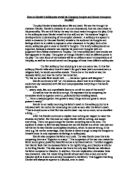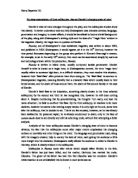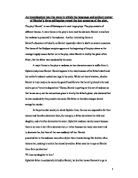We, the audience, can also see that these are Hamlets true inner thoughts as they almost flow out of his mouth as he gets caught up in the moment. Ad this soliloquy is full of interpretations, rushes of thought and language, which also suggests that Hamlet is getting caught up in the moment. The language in this soliloquy resembles a train of thought. The words flow together with commas that continue this flow.
As well as studying the text of Hamlet, I am also studying two versions of Hamlet in the form of a play. The two films I watched each portrayed these soliloquies in different ways. The first noticeable difference between the two is the fact that, the Peter Brooks version concentrates on the actor’s face that plays Hamlet. While the Mel Gibson version focuses more on the setting. I do not think that the reason for this is one is a low budget film while the other is not. I think that both versions want to portray Hamlet in different ways. The Peter Brooks version portrays Hamlet as a strong minded character, focusing on every word that Hamlet speaks. While the Mel Gibson version also does this (but not nearly as much), but as a lot of the focus is on the setting, this suggests that Hamlets words can not express his true feelings as well. It is though the setting dramatises the words that Hamlet speaks. This also is a reason for why in the Mel Gibson version, of this soliloquy, has been cut down.
The only similarity there is in both films is that; the actor’s never look at the camera. I think that this suggests that Hamlet does not need to prove himself to anyone; he is not trying to convince us, the audience, that his feelings are right (or the right way to think and feel). Hamlet believes that his are beliefs are true and know one will change his mind. Hamlet’s character does not need to keep a hold of the audience by addressing them with looks or suggestive posses.
So already in this first soliloquy we see how intelligent Hamlet is, how he thinks over situations. He does not just sit back and take things as they come. It is though Hamlet already, sub-consciously, knows that Claudius is unlawfully the king. So from here the audience feels like Hamlet’s character is strong minded, intelligent and a deep thinker. At the moment the audience does not know if Hamlet is going to be brave enough to change things. Though, we do get the sense that Hamlet will just take things as they come. This is where the audience claps their first sense that action may happen in the near future. Hamlet is also seen as almost as brave, as it seems he is going to change this to make them seem right. He is not seen as a coward for this very reason, as well as, he has not committed suicide. But this is mainly down to the fact that it is a sin. So maybe he is not so brave. However the audience looks past this as not an act of coward ness but as an act of bravery to stand-up in what he believes in.
The second soliloquy that I am studying is in act 2. Here Hamlet express disapproval of the way he can not act to avenge his dead father.
““….what a rouge and peasant slave am I!”
Hamlet later explains how he is going to trap Claudius. Hamlet is also frustrated how actors can act with feelings, while hamlet has lots of motivation (and reasons) to avenge his father yet he can not act on this.
“……Is it not monstrous that this player here, But in a fiction, in a dream of passion force his soul so to his own conceit…..”
Hamlet is also still trying to make sense of the world.
I think in this soliloquy we, the audience, see how intelligent and self-aware Hamlet really is. He even considers himself as a “coward”. And this is the first time we the audience think Hamlet is actually a coward, and actually start to wonder is Hamlet is going to live up to what he is saying.
“Am I a coward...But I am pigeon livered, and lack gall To make oppression bitter...”
Alliteration is used in this Soliloquy. Out of the soliloquies I am studying, this is the first that I have seen alliteration. The use of alliteration makes the words stand clear from the rest, it emphasises them. This means they must be important for such emphasis to be laid upon them. Especially the way, even when u read them, they make u spit them out. It is though they are disgusting, poisoned, and almost shameful. These words are said as hamlet is questioning about how he does nothing to avenge his father. So this shows the way he is ashamed of the way he does nothing.
“Bloody, bawdy villain!”
With Hamlets realisation of how he has done nothing to avenge his father, he comes up with an idea. Hamlet will watch his uncle to see how he reacts when he sees a play of a murder which resembles King Hamlets. Hamlet also shows his disgust in Claudius by calling him a creature. This shows that Hamlet thinks that for someone to murder, they must (almost) not be human.
“Hum I have heard That guilty creatures sitting at a play Have by the very cunning of the scene Been struck so to the soul……”
The Mel Gibson version of this concentrates on the anger that Hamlet is feeling. This is shown by the way Hamlet is standing. It is as if Hamlet can not bear it anymore (all his anger) and needs something to be done. The Mel Gibson version also starts about half way down the soliloquy. This is because half way down, in the soliloquy, Hamlet ‘starts to get going’ therefore gets more aggressive. Also Hamlets character is seen as more unpredictable as three quarters down the script, Hamlet does calm down. This is because he has finally thought of a plan.
The Peter Brooks version is different. In this version Hamlet is seen calmer and in deep thought more than the Mel Gibson version. This is expressed in the way that the actor is sitting down. Also “bloody bawdy villain” is left out. This too makes Hamlet seem less aggressive. The way none of the script is cut out, makes Hamlet seem as though he is able to work through is feelings and emotions, therefore a more stable and in control character
In this soliloquy we see how Hamlets mood has changed more aggressive and more frustrated. Though this seems to work best for Hamlet, as with theses feelings he later is able to come up (finally) with a plot. Hamlets character becomes more complex in this soliloquy. We no-longer think of Hamlet as a man whom will act on his feelings. Now of a man, who is scared to act on his feelings, yet knows he is a coward and he should, but physically he can’t. This is maybe because he is not yet mentally prepared. It seems that Hamlet has to be frustrated with his feelings and hate himself for not acting, to then later be able to mentally carry out what he first intended to do.
The third soliloquy I am studying is in act three scene one. In this soliloquy Hamlet is still discussing the meaning of life and death. Hamlet is scared of what happens after death.
“To be, or not to be….”
This is all before a meeting with Ophelia. This soliloquy does not advance the story. Instead it shows us a lot about how Hamlet thinks things through. Also in this soliloquy Hamlet is still delaying murder. Hamlet is spilt; on one hand he wants revenge for his father, on the other, he is an intelligent student which is teachings go against ghosts. This soliloquy is also different to the rest in the way that he reflects on general issues. There are no direct references about other people. This is maybe because Hamlet has now almost totally withdrawn himself from the world.
Hamlet discusses how, if you can’t win a battle, you can still fight. But what is the point? Hamlet is thinking things through; this intelligence makes him a coward.
“…to take arms against a sea of troubles, And by opposing, end them…”
Onomatopoeia is used in this soliloquy. This makes the words come alive and stand out. This is needed as it is about death. Which, discussing death seems to be very important to Hamlet.
“…shuffled off this mortal coil…”
Ophelia is mentioned right at the end of this soliloquy. I think this is to show that Hamlet is not as alone as he thinks he is. He could rely on Ophelia and talk to her, yet he keeps his feeling to himself.
“The fair Ophelia! Nymph, in thy orisons Be all my sins remembered.
In the Peter Brooks version, there is emphasis on part of this speech. This shows that, in this version Hamlet is seen to be thinking about death, and is scared of it as it has been mentioned several times. The emphasis is shown by a pause by the actor when saying
“To die-to sleep…”
Also in this version there are longer pauses which show deep thought. And even a slight struggle to contemplate these ideas. But as he is still discussing them it shows they are important.
Hamlet is sitting down in this version. He never stands up. This shows ‘us’ how there is no aggression. As well as the fact that he never raises his voice. This version is less emotional. It is more serious, the actor uses a lower tone of voice in some areas of the speech. The camera zooms in on Hamlets face, yet he never looks at it. This suggests that Hamlet is trapped inside his head. Also this is shown by the way Ophelia doesn’t come into the scene (this has been excluded from this version).
The Mel Gibson version is more about setting. It is set by the grave of Hamlets diseased father. This version is set here to show how Hamlet must (or so he feels) live up to gat revenge for his father. Also this emphasis on the scenery shows how death is inside Hamlets mind.
This version of Hamlet makes his character seem less calm. The actor gets angry, clams down, moves around (e.g. lays on the floor) at certain points. All these emphasis how complicated Hamlets mind is. And how confused he still is As well as how unpredictable his character is.
Yet again we see, in this soliloquy, how intelligent Hamlet is. How he contemplates important situations in his mind. Death plays a very important role in this soliloquy. Hamlet is constantly thinking about it. Though in this soliloquy we see how frightened Hamlet is of death. Also this soliloquy shows how alone Hamlet is, as there is no mention of anyone (only when Ophelia enters the room). So this soliloquy shows how Hamlet is trapped, he is far too intelligent for this play and therefore is alone. This is shown in the way that he has cut himself off from the world (almost entirely).
Soliloquies are extremely important in this play. Without them we would know nothing of Hamlets intellect, how he plans to get revenge, and what he is really like. Only in soliloquies do we, the audience, get to see the ‘real’ Hamlet. This means that none of the other characters in the play really know what he is like. This is maybe why Hamlet cuts himself off from the world, because he knows that he can not tell anyone what he is truly thinking, hence he trusts no one. This lack of trust in people comes from the murder of his father. Hamlets moods and thoughts change a lot throughout the play. Without the soliloquies we would find it hard to understand Hamlet, and therefore the play. These soliloquies help the audience understand why Hamlet does the things he does e.g. excludes himself from the world. Soliloquies are important in this play as they reveal how Hamlets character. These soliloquies also show how Hamlet takes it upon himself, alone, to find out the ‘truth’. As well, the soliloquies in the play reflect the tension in Hamlets mind; he resists the outside ideas while continuing his own ideas inside his mind.








